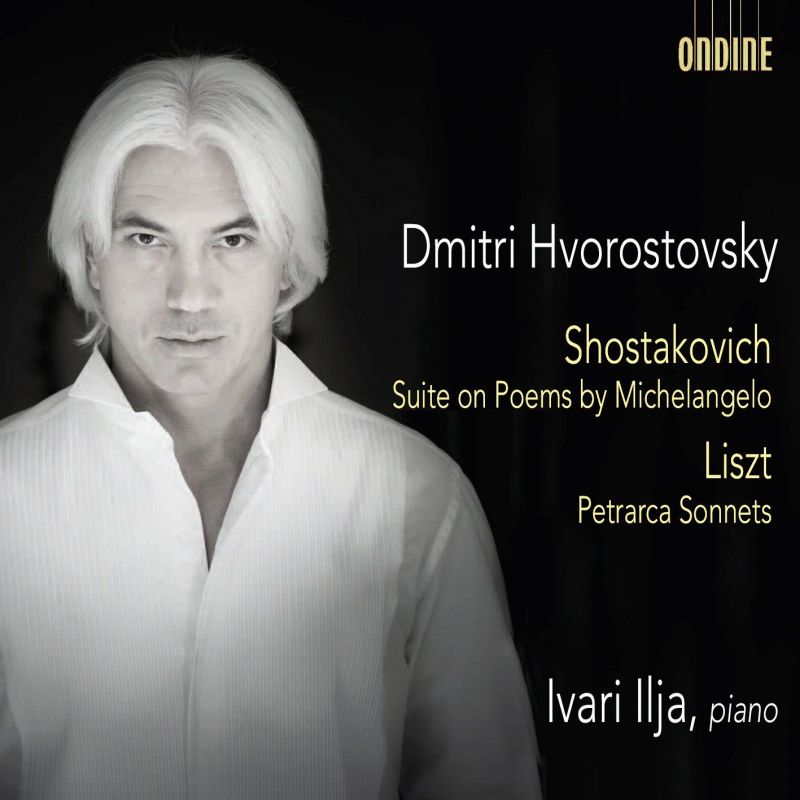SHOSTAKOVICH Michelangelo Poems LISZT Petraca Sonnets
View record and artist detailsRecord and Artist Details
Composer or Director: Franz Liszt, Dmitri Shostakovich
Genre:
Vocal
Label: Ondine
Magazine Review Date: 12/2015
Media Format: CD or Download
Media Runtime: 58
Mastering:
DDD
Catalogue Number: ODE1277-2

Tracks:
| Composition | Artist Credit |
|---|---|
| Suite on Verses of Michelangelo |
Dmitri Shostakovich, Composer
Dmitri Hvorostovsky, Baritone Dmitri Shostakovich, Composer Ivari Ilja, Piano |
| (3) Sonetti di Petrarca |
Franz Liszt, Composer
Dmitri Hvorostovsky, Baritone Franz Liszt, Composer Ivari Ilja, Piano |
Author: Mark Pullinger
Dmitri Hvorostovsky has always been just as comfortable on the recital platform as on the operatic stage, a state of affairs happily reflected in the Siberian baritone’s discography, packed with songs by Rachmaninov, Tchaikovsky and Mussorgsky. But Italian poetry is the inspiration for this new disc, pairing Shostakovich’s bleak settings of Michelangelo (in Russian) with Liszt’s Petrarch Sonnets.
Shostakovich composed his suite of 11 songs to mark the 500th anniversary of Michelangelo’s birth, although the seed may well have been sown when he heard Benjamin Britten’s Seven Sonnets in Moscow in 1966. Evgeny Nesterenko gave the world premiere in 1974 and recorded the cycle the following year under the composer’s watchful eye.
Hvorostovsky’s baritone isn’t as saturnine as Nesterenko’s bass, of course, but the compensation comes in the heroic ring in his upper register. But there’s no grandstanding here, as can be his way in opera. Hvorostovsky offers searching readings of these rugged, jagged songs which are full of resignation and bittersweet regret, of loss and separation. The later songs anticipate death, yet the final offering, ‘Immortality’, thumbs a nose at death in an insolent piano part – death cannot destroy the artist’s legacy – where the nursery-rhyme simplicity is reminiscent of the Fifteenth Symphony’s ‘toyshop’.
Ivari Ilja, Hvorostovsky’s regular accompanist, catches the prickly anger in ‘Creativity’, hammering at his forge. Ondine captures richer piano tone than Melodiya’s rather shrill recording. Although Nesterenko is more anguished in characterisation, Hvorostovsky caresses the vocal line more in songs such as ‘Night’, with fewer intrusive intakes of breath than on some of his discs. There are few things finer than Hvorostovsky in full flight and Liszt’s Petrarch Sonnets allow him the chance to open up the Italianate warmth in his baritone, with impassioned accounts, especially of Sonnet 47.Discover the world's largest classical music catalogue with Presto Music.

Gramophone Digital Club
- Digital Edition
- Digital Archive
- Reviews Database
- Full website access
From £8.75 / month
Subscribe
Gramophone Full Club
- Print Edition
- Digital Edition
- Digital Archive
- Reviews Database
- Full website access
From £11.00 / month
Subscribe
If you are a library, university or other organisation that would be interested in an institutional subscription to Gramophone please click here for further information.




